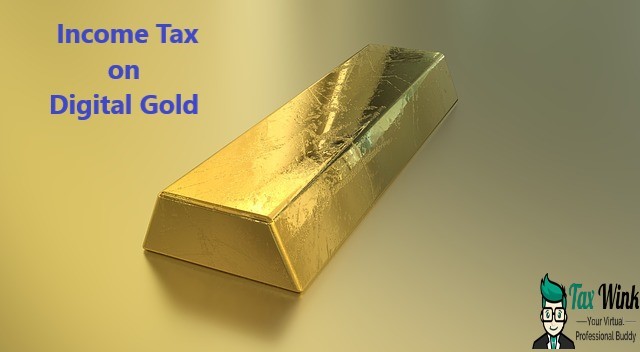Income Tax on Digital Gold in India

In our previous article “Tax on Gold Jewellery in India”, we discussed the manner physical gold is taxed in India under the Income Tax Act. However, in recent times, we have seen that more and more people are investing in the gold in digital modes like Gold ETF or Gold Mutual Funds or Gold Derivatives, etc. for which there is a lack of knowledge amongst the investors about the income tax implications. This article specifically covers the taxation issues revolving around the digital modes of gold investment. Read carefully…
Income Tax on Sovereign Gold Bonds (SGBs)
Sovereign gold Bonds are regarded as one of the safest investments in the Digital Gold Segment because these are issued by the Government of India and a fixed interest @ 2.5% p.a. is given on the bonds, in addition, to gain in the form of appreciation in the gold prices. The following points are to be noted in this respect:
- Interest received on Gold Bonds (SGB) by the investor is to be shown under the head “Income from Other Sources” while e-filing income tax return. Interest income is taxable as per applicable tax slab.
- Sovereign Gold Bonds carry a lock-in period of 5 years and a maturity period of 8 years. If SGBs are redeemed on expiry of 8 years, the entire capital gain arising on maturity shall be exempt from tax.
- If SGBs are redeemed after 5 years but before 8 years, long-term capital gain arising on redemption of SGBs shall be charged to tax @ 20% plus cess @ 4%. Thus, the effective tax rate will be 20.80%. However, you can take indexation benefits thus reducing your tax liability substantially.
Alternatively, you can sell SGBs in the secondary market even before the expiry of 5 years. In the case where the gold bonds are sold before 3 years in the secondary market i.e. stock exchange, it shall be treated as “Short Term Capital Gains” and shall be taxed as per the normal applicable tax rates in the income tax return.
Income Tax on Gold Derivatives
Gold Derivatives are the derivative contracts where the underlying asset is gold. An investor can buy gold derivatives (Futures or options) from the commodities market namely NCDEX or MCX. The income tax treatment on the sale of gold derivatives is similar to that of commodity derivatives. The following points are to be noted in this regard:
- Trading in Gold Derivatives is treated as a “Non-Speculative Business”. As such, any profits or loss on trading in gold derivatives shall be treated as non-speculative business income of the assessee.
- You can also claim a deduction towards expenses incurred against such income. The net gains or losses in gold derivatives are to be disclosed by filing income tax return in form ITR-3.
- Under ITR-3, you are required to give details of assets and liabilities in the Balance Sheet and the details of turnover and gains/ losses in the Profit & Loss Account.
- Income from Gold Derivatives is taxable at the applicable slab rates.
Learn about How to calculate turnover & profits in derivatives
Income Tax on Gold Mutual Funds & ETFs
Income tax treatment in the case of Gold Mutual Funds or ETFs depends upon the period of holding an investment in MF/ETF. If the investor sells Gold MF/ETF after holding it for a period of 3 years or more, the gain arising on its sale shall be treated as “Long-Term Capital Gains”. Gains from the sale of Gold MF/ETF are to be declared under the head “Capital Gains” in ITR return.
- In case the gain on the sale of Gold MF/ETF is ‘Long Term Capital Gain”, income-tax shall be chargeable at the rate of 20% plus cess @ 4%. However, the taxpayers can take advantage of indexation and reduce tax liability substantially.
- If the sale of Gold MF/ETF takes place within 3 years of its purchase, it shall be treated as “Short-Term Capital Gains” and taxable at the applicable tax slab rates.
Income Tax on Digital Gold held in wallets
It is the newest form of investing in gold where you can purchase gold in mobile wallets like Paytm, ET Money, etc. In this case, the investor does not have possession of physical gold rather the gold is held in digital form in the mobile wallets. You can purchase digital gold online and also sell it online at any time as per your convenience. The Income Tax Treatment on sale of the digital gold is the same as for physical gold:
- If the digital gold is held in the wallet for a period of 3 years or more, it is “Long-Term Capital Gains” and is chargeable to tax @ 20% plus cess @ 4%. Indexation benefits will be available to the taxpayer while calculating long-term capital gains.
- If the digital gold so held in the mobile wallets is sold before 3 years from the date of purchase, it is “Short-Term Capital Gains” and will be liable to tax at the tax slab applicable to the taxpayer.
Conclusion:
Investing in digital gold is similar to that investing in physical gold. Also, the benefits and tax implications of digital gold are somewhat similar to that of physical gold. However, digital gold can be considered safer in comparison to physical gold which is the reason why the young generation is more interested in buying gold in digital mode.
For any ITR filing online assistance connect at 9660930417
Read Related Articles:
Tax on Gold Jewellery in India
Gold & Silver Rates for the Income Tax Purposes
Taxation of Sovereign Gold Bonds



